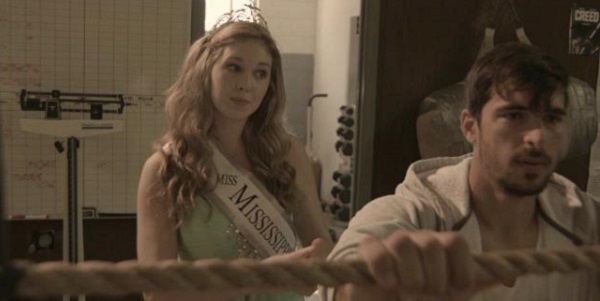I’m not one of those women who has dreamed of her wedding day since she was a little girl; for most of my youth, I assumed I would never get married and that was fine. As I am set to tie the knot in October, clearly I was wrong in my assumptions. But even as I attempt to plan my impending nuptials, wedding-related things remain pretty far down on my lengthy list of interests, some ways below watching soccer, practicing doing my makeup like Marlene Dietrich, and training for my second marathon. Needless to say, I’m typically not a fan of marriage-focused movies unless they’re the Jane Austen variety, packed with wit and ravishing Regency fashions. Unless Mr. Darcy, Lizzie Bennet and their ilk are involved in some way, shape or form, I’m not interested.
However, as someone who would also rate female-focused fight flicks (see: my review of Legally Blonde meets Rocky, it tells the story of Delilah (Jessica Harthc*ck), a Mississippi beauty queen who has devoted her entire life to winning pageants and a husband. However, when said husband jilts her at the altar before they can tie the knot, Delilah decides to get revenge by challenging him to a boxing match. A vengeful woman discovering her self-worth by learning how to kick a man’s butt? Sign me up! Or so I thought. Unfortunately, Fighting Belle is far more stereotypical than it is empowering.
Hey There Delilah, How is Life in Mississippi?
Delilah has won pretty much every beauty pageant title in the South, but that doesn’t stop her fighter fiance Kelvin (Ryan Czerwonko) from cheating on her with her friend and bridesmaid Marney (Sherri Eakin) and then declaring at the altar that he’s not ready to settle down just yet. A furious Delilah takes a swipe at him, and spends the next few days wallowing in pizza, pajamas, and her job selling perfume at a local boutique – before the perfect idea to avenge her lost honor hits her: she’ll challenge Kelvin to a boxing match.

Delilah marches to the local gym and convinces reluctant trainer Tandy (Noah Cook) to take a chance on a would-be female fighter wearing a tiara, gown, and pageant sash. The determination and diligence that served her so well on the pageant circuit helps Delilah prove herself in the ring – and win Tandy’s heart. But her mother doesn’t approve of violent pursuits that might ruin her perfect face and ladylike demeanor, and Kelvin isn’t exactly keen on being potentially humiliated. These and other obstacles threaten to knock Delilah out of the fight before it has even begun.
Low on Budget and on Laughs
Fighting Belle was shot on a shoestring budget, and it shows. The lighting is poor, the sound recording is of such low quality that the dialogue is occasionally incomprehensible, and the sound mix jumps from cut to cut, with no effort to smooth it out across the edits. Needless to say, this is all incredibly distracting. However, one cannot entirely blame the film’s low budget for the reasons why it doesn’t succeed. There are plenty of low-budget films that, while not technically perfect, sparkle in other ways. Fighting Belle is not one of them.
Odd little touches that you can tell are meant to be funny just fall flat. From Delilah’s insistence on wearing one of her vast collection of pageant sashes at all times, including over her wedding gown and boxing gear, to the over-the-top oration of the minister who also serves as announcer for the climactic boxing match, to the older woman who insists on trying every perfume in Delilah’s shop every single day and then doesn’t buy any of them – all of this is presented with an excessively obvious wink, as though to say, “Look how quirky all of our characters are! Don’t you love it?”
The film is also chock full of stereotypes, including Delilah’s shrill Southern matriarch, Tandy’s precocious and rebellious younger sister, the sassy gay with Richard Simmons-style hair, and Slice (Donnie Pierre), the token tough girl at the boxing gym. Slice is initially threatened by bubbly blonde Delilah but ends up becoming her ally after Delilah gives her a makeover. At the end of this cringeworthy sequence, when Slice shows off her new, more feminine look, one of the other fighters proclaims, “Are you an orphanage? Because I want to put a baby in you.” Perhaps it is supposed to be parody, but like the awkward jabs of an inexperienced boxer, these jokes are too clumsy to land properly.
All of this builds up to the final fight between Delilah and Kelvin, and a syrupy-sweet ending that reinforces the stereotype that all any good girl really wants is to just get married. If Tandy had been presented as a friend, instead of a love interest, to Delilah – or if a woman like Slice had been assigned the role of Delilah’s mentor and coach instead – then Delilah’s story would have been far more inspirational. Inserting an overpowering romantic subplot into Delilah’s tale of redemption takes Fighting Belle’s initially unique premise and turns it into just another wedding movie.
Fighting Belle: Conclusion
I really wanted to like Fighting Belle. I wanted it to be a camp classic, the next great B-movie, a Southern-fried tale of female revenge in the style of Quentin Tarantino’s Kill Bill. Perhaps my expectations were misguided, or at the very least too high. Either way, I was disappointed.
What do you think? Are marriage-focused movies outdated in the twenty-first century? Share your thoughts in the comments.
Fighting Belle is available for rental and purchase on Amazon. Additional release dates can be found here.
Does content like this matter to you?
Become a Member and support film journalism. Unlock access to all of Film Inquiry`s great articles. Join a community of like-minded readers who are passionate about cinema - get access to our private members Network, give back to independent filmmakers, and more.